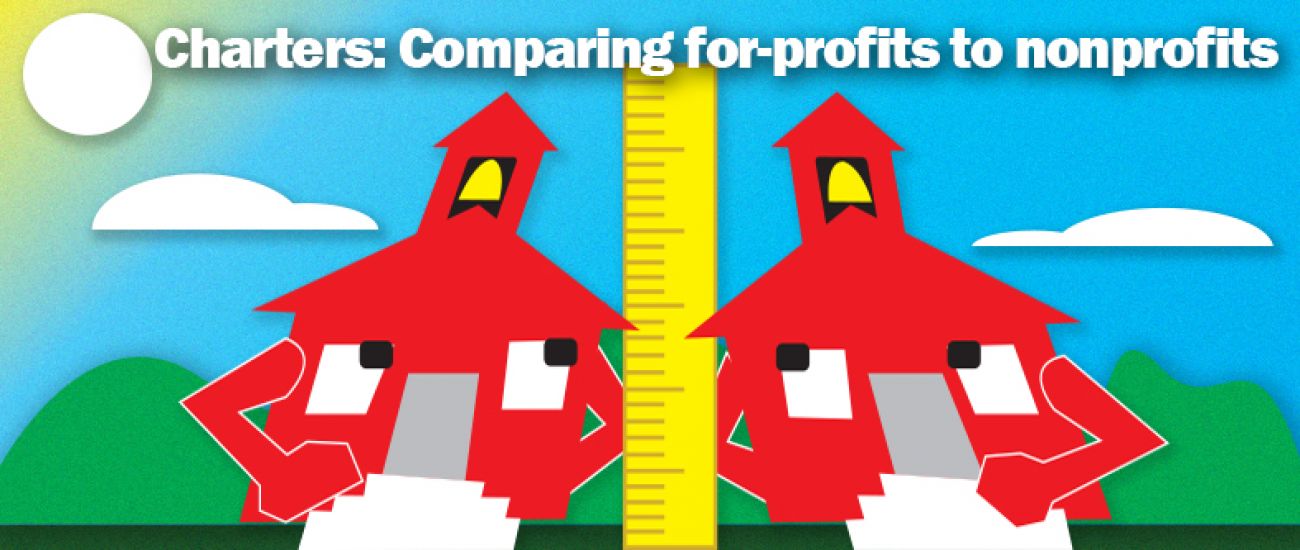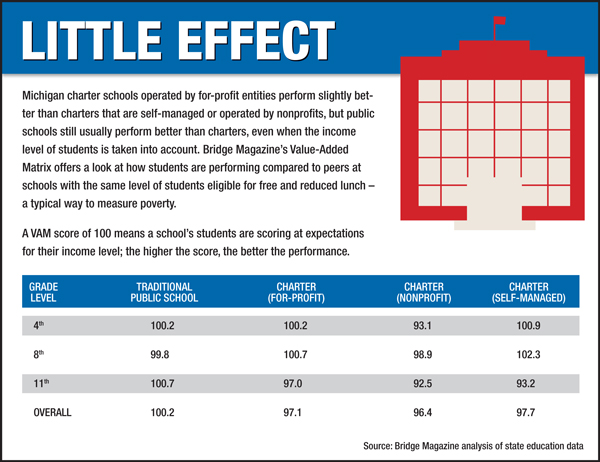Pursuit of money, learning mix

Do the profit motive and learning mix? In Michigan, the answer, so far, is – yes.
Students at Michigan charter schools operated by for-profit companies perform the same or better academically as their peers at charters run by nonprofits, according to a Bridge Magazine analysis.
While they perform the same, they don’t always perform well. Some charter schools are among the best schools in the state, but a troubling proportion -- run by for-profits, nonprofits as well as self-managed -- perform far below the norm.
The findings are of critical interest to parents and policy-makers in Michigan, which has the highest proportion of for-profit charter schools in the nation. In December 2011, several legislators proposed a ban on for-profit charter operators, citing concerns that the search for profits undermined education.
The executive director of Royal Oak-based Education Trust-Midwest wasn’t surprised by the findings. Raising academic achievement “is not about governance of schools,” said Amber Arellano, “it’s about performance.”
Little difference found in data
The analysis, conducted in partnership with Public Sector Consultants, a Lansing-based research firm, builds upon Bridge’s State Academic Champs ranking, which scored traditional districts and charters by how well they fare compared to other schools with the same poverty levels. In essence, the analysis ranks schools by how much value they add to a student’s expected education. See how your school ranks in the state.
That analysis found that most charter schools are clumped at the ends -- among the top and bottom schools in the state.
In 11th-grade MEAP scores, 52 percent of charter schools scored in the bottom quarter of the Value-Added Matrix (VAM), compared to 21 percent of traditional districts. Overall, 48 percent of charters have VAM scores in the bottom quarter, compared to 22 percent of traditional districts.
But in that same analysis, three of the top five schools were charters.
Whatever separates high-performing charters from low-performing charters, it doesn’t appear to be the schools’ business models.
Charters operated by for-profit companies and those operated by nonprofit associations were similar in their students’ academic performance, with for-profit-operated schools scoring slightly better on average. How do nonprofit charters, for-profit charters and traditional schools compare?
Both had a VAM average just slightly below the average traditional school overall.
“What you found is what is found whenever it is looked at,” said Gary Naeyaert, senior adviser for the Gov. John Engler Center for Charter Schools at Central Michigan University. “There has been no research I’m aware of that shows any performance differential between a management company that is for profit versus nonprofit.”
Nevertheless, New York state banned for-profit operation of charter schools in 2010. Education reformer Diane Ravitch, once an outspoken proponent of charter schools, now rails against for-profits, telling The American Prospect magazine last fall that “corporations aren’t going to put more money into the school, they’re only going to make money. This should make people in America angry. There ought to be a public uprising about this effort to destroy public education.”
In 2011, after the Legislature and Gov. Rick Snyder lifted the cap on the number of charter schools, state Sens. Rebekah Warren, D-Ann Arbor, and Hoon-Yung Hopgood, D-Taylor, introduced legislation to ban for-profit companies from operating charters in Michigan.
“Our leadership is now opening the floodgates and sending tax dollars directly to for-profit, corporate managed schools,” Warren said at the time. “Public education has always been the great equalizer in our society and I remain steadfast in my dedication to that ideal. There is simply no place for profit in the classroom.”
“Despite my many attempts to prevent this forced privatization of our education system, Republican leadership in the Legislature is clearly determined to undermine public education as we know it,” Hopgood said in 2011. “The resulting system will push faltering districts to the point of failure and use our tax dollars to subsidize the bottom lines of for-profit education corporations around the country.”
Neither Warren nor Hopgood could be reached for comment on Bridge’s analysis.
Naeyaert argues that profit versus nonprofit “is not where the debate should be.
“People believe on the street that a nonprofit entity is more pure. But there is no difference here.”
Dan Quisenberry, president of the Michigan Association of Public School Academies, a charter school group, believes the debate going forward will be over “standards and metrics” that offer a nuanced view on school success, and how to spread that success. School reform “is about the quality of the education they’re providing, not the adults running it,” Quisenberry said.
National Heritage stands out
National Heritage Academies, a national for-profit company, stood out as operating the best-scoring charters in Michigan, with over half of its 46 schools ranking in the top quarter of all traditional schools and charters in the state.
“It’s a demonstration of the hard work we’re doing,” said NHA’s Todd McKee. “We want to get all our kids to a college readiness standard, but we want our competitors to get there as well . Our competitors aren’t there yet.”
Arellano admits that it’s “naive” to believe the profit motive doesn’t have an impact at some schools. Not all for-profit companies operate charters that are as successful as National Heritage Academies.
“We need to be honest about what may fuel the interest in opening more schools,” Arellano said.
Still, her organization has remained neutral on the profit/nonprofit debate. “It’s a quality issue (rather than governance,) Arellano said. “It’s hard for people to wrap their heads around that,” she said.
Senior Writer Ron French joined Bridge in 2011 after having won more than 40 national and state journalism awards since he joined the Detroit News in 1995. French has a long track record of uncovering emerging issues and changing the public policy debate through his work. In 2006, he foretold the coming crisis in the auto industry in a special report detailing how worker health-care costs threatened to bankrupt General Motors.
Michigan Education Watch
Michigan Education Watch is made possible by generous financial support from:
Subscribe to Michigan Education Watch
See what new members are saying about why they donated to Bridge Michigan:
- “In order for this information to be accurate and unbiased it must be underwritten by its readers, not by special interests.” - Larry S.
- “Not many other media sources report on the topics Bridge does.” - Susan B.
- “Your journalism is outstanding and rare these days.” - Mark S.
If you want to ensure the future of nonpartisan, nonprofit Michigan journalism, please become a member today. You, too, will be asked why you donated and maybe we'll feature your quote next time!




